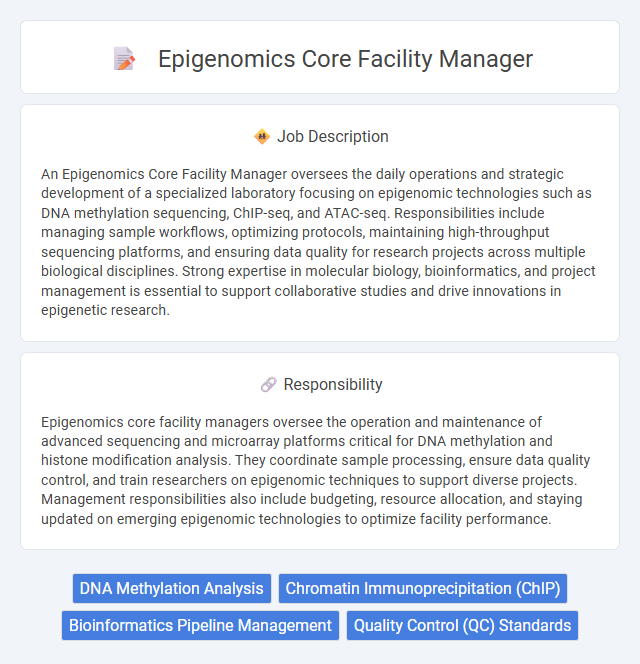
An Epigenomics Core Facility Manager oversees the daily operations and strategic development of a specialized laboratory focusing on epigenomic technologies such as DNA methylation sequencing, ChIP-seq, and ATAC-seq. Responsibilities include managing sample workflows, optimizing protocols, maintaining high-throughput sequencing platforms, and ensuring data quality for research projects across multiple biological disciplines. Strong expertise in molecular biology, bioinformatics, and project management is essential to support collaborative studies and drive innovations in epigenetic research.
Individuals with strong organizational skills and a background in molecular biology or genetics are likely to be suitable for the role of an Epigenomics Core Facility Manager. Those comfortable with managing advanced laboratory technologies and coordinating research projects may find this position aligns well with their skill set. Candidates who thrive in collaborative environments and can handle both technical and administrative responsibilities might have a higher probability of success in this role.
Qualification
A manager in an Epigenomics core facility requires advanced expertise in molecular biology, genomics, and epigenetic techniques such as ChIP-seq, ATAC-seq, and bisulfite sequencing. Proficiency in data analysis tools like R, Python, and bioinformatics pipelines is essential for interpreting complex epigenomic datasets. Strong leadership skills and experience in laboratory management ensure efficient operation and support for multidisciplinary research projects.
Responsibility
Epigenomics core facility managers oversee the operation and maintenance of advanced sequencing and microarray platforms critical for DNA methylation and histone modification analysis. They coordinate sample processing, ensure data quality control, and train researchers on epigenomic techniques to support diverse projects. Management responsibilities also include budgeting, resource allocation, and staying updated on emerging epigenomic technologies to optimize facility performance.
Benefit
An Epigenomics core facility manager likely offers significant benefits by ensuring cutting-edge technology access and streamlined workflows for research teams. They probably enhance data quality and reproducibility, which may accelerate discoveries and publication rates. This role potentially supports collaborative projects, increasing funding opportunities and institutional prestige.
Challenge
Managing an Epigenomics core facility likely involves the challenge of integrating rapidly evolving technologies while ensuring high-quality data output. Balancing resource allocation and maintaining cutting-edge equipment may require constant adaptation to new scientific demands. Effective coordination of multidisciplinary teams to support diverse research projects might also pose significant logistical complexities.
Career Advancement
Epigenomics core facility managers oversee advanced genomic technologies and data analysis, driving innovation in epigenetic research. Mastery in cutting-edge sequencing platforms and bioinformatics tools enhances leadership opportunities in academic and biotech sectors. Strategic collaboration with research teams and expertise in project management accelerate career advancement toward director or principal investigator roles.
Key Terms
DNA Methylation Analysis
Epigenomics core facility managers specializing in DNA methylation analysis oversee advanced workflows involving bisulfite sequencing, methylated DNA immunoprecipitation (MeDIP), and array-based methylation profiling such as Illumina Infinium platforms. They ensure quality control, data integrity, and protocol optimization for detecting cytosine methylation patterns across the genome, facilitating epigenetic research and biomarker discovery. Expertise in bioinformatics tools like Bismark, methylKit, and QIAGEN's Epigenomics Suite is essential to interpret methylation data and support collaborative projects in cancer, developmental biology, and environmental epigenetics.
Chromatin Immunoprecipitation (ChIP)
Epigenomics core facility managers specializing in Chromatin Immunoprecipitation (ChIP) oversee the implementation and optimization of ChIP assays to investigate protein-DNA interactions and epigenetic modifications. They ensure high-quality sample processing, antibody validation, and data analysis workflows using next-generation sequencing platforms. Expertise in chromatin shearing, immunoprecipitation protocols, and bioinformatics tools is essential for delivering accurate epigenomic insights supporting research across gene regulation and disease mechanisms.
Bioinformatics Pipeline Management
Epigenomics core facility managers oversee the development and maintenance of bioinformatics pipelines essential for analyzing DNA methylation, histone modifications, and chromatin accessibility data. Expertise in software tools such as Bismark, MACS2, and ATAC-seq pipelines ensures robust data processing, quality control, and integration of multi-omics datasets. Their role entails optimizing computational workflows to handle high-throughput sequencing data, enabling accurate interpretation of epigenetic landscapes for research applications.
Quality Control (QC) Standards
Epigenomics core facility managers enforce rigorous Quality Control (QC) standards to ensure the accuracy and reproducibility of epigenetic data, including DNA methylation, histone modifications, and chromatin accessibility assays. They develop and implement standardized QC protocols for sample preparation, sequencing, and data analysis workflows, minimizing technical variability and contamination. Maintaining compliance with institutional guidelines and ensuring consistency across multiple experiments is critical for producing reliable and actionable epigenomic datasets.
 kuljobs.com
kuljobs.com